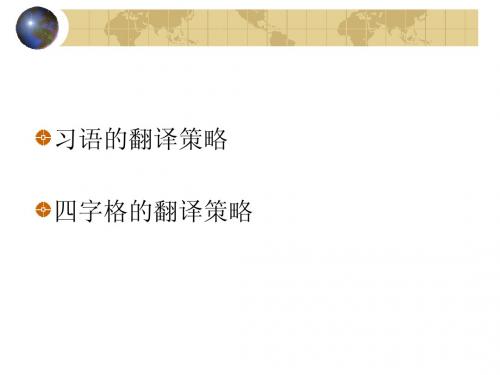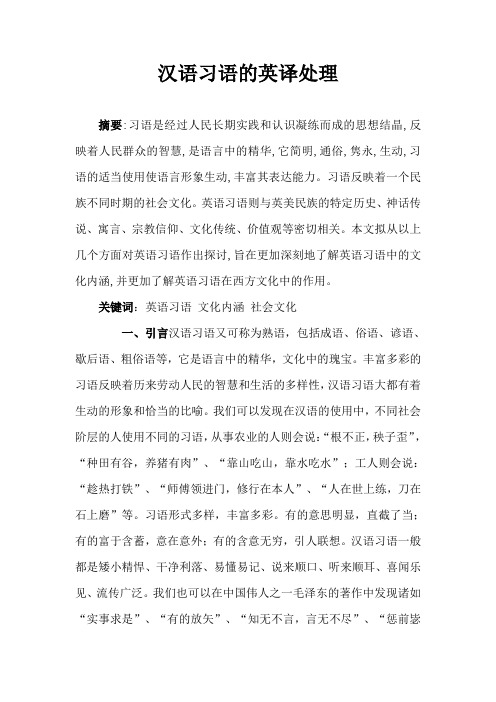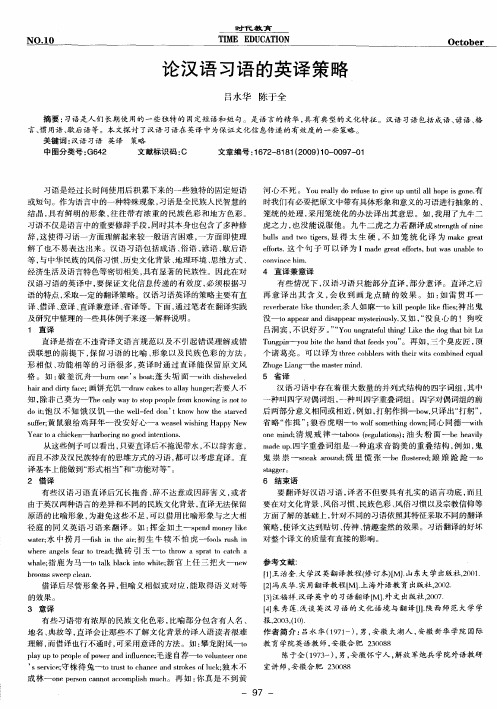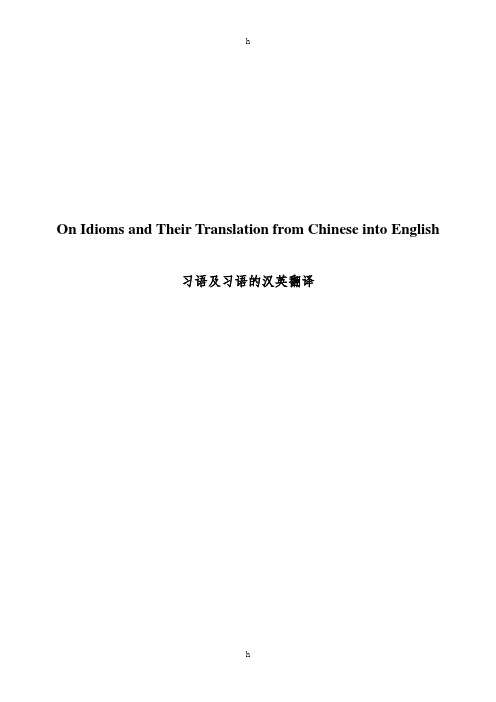关于汉语习语的英译
浅析汉语中习语的英译方法

一
、
习语翻译的文化内涵
二、汉语习语的英译方法
翻译工作者研究汉语习语的英语翻译,目的是为了弘扬我们的 巴尔胡达 罗夫曾说过 : 翻译是将一种语言 的言语产物 ( “ 话语 ) 在保持 内容,即意义不变 的情 况下改变为另外一种语 言的言语 产物 传统文 化,以供英语文化 国家借鉴 、交流, 同时又可 以将 我们的优 的过程。 l ”【 】 鉴于习语本身种类繁多、特点各异,翻译工作者在英译 秀历史文化发扬光大,不致逐渐埋没。所以,为了弘扬国粹,翻译 时虽可不苛求其形式完全对等,但也务必使其意 完全对应,不致 工作者应当尽可能准确而又不失优美地将我国的语言精华以翻译的 译事三难:信、达、雅” I 。D 使将 “ 新官上任三把火 ” Anwboms ep en 译成了 Anw 形式传播向世界,翻译大家严复曾日 “ ( e r es l ) o w ca e 针对习语的各类特点, 我们在翻译时要保证其“ ( 信” 译文正确无误, o crih re r 而贻笑 大方 。 根据 R R K 哈特 曼与 FC 斯 f el tt e e i f g sh f s i 而 .. , .. 、 达”( 译文要通顺流畅) 还要求其 “ , 雅”( 译文要富 托克在 《 语言与语言学词典》一书中的定义:“ 习语是具有特殊的、 忠实于原文) “ 有文采 ,译 原作的意蕴美质 ) 可使用 三类英译方法:直 译法 ,意 。 通常并不等于 各单个词义 总和涵 义的短语和句子 ;一般不 能逐字直 译成另一种语言, 这样做会失掉其特殊含义,如T aS om p f 译法 ,套译法 。 htn t y u ’ c o ( )直 译法 ( ir r s t n 一 L e l a li ) t aT n ao t 那不合 我胃 口) e a( ,或 hl telep a 请 别挂电话 )”这个 o n l s d h i e e( 。 对于文字 表述开门见 山,意思也 一 目了然 ,在 中英文 化中均有 定义 充分体现 了习语在某种特殊语 言中的独特性 以及相应 的翻 译难 度 ,习语在汉语 中是增强表达 能力 的一种有力手段 ,往往蕴含着 丰 此种说法 的习语 ,可选用对 等直 译,如成语 : 富的民族文化特色和文化信息,如果在翻译过程中能尽量把这一文 化特色表现出来,会为文章增色不少。 文化是语言的内在基础,语言是文化的外在表现,两种语言的 交流首先反映的是两国文化的切磋。而习语作为语言中的精华,更 是体 现了英汉文化 的异同 比较 ,那 么,我们的习语翻译就可 以从寻 找文 化的异 同入 手 。 朱 光潜先生存 《 谈翻译》一 迁中曾说道 :“ 如 果我们不熟悉 一国的人情风俗和 文化历史背景 ,对 于文 的这种意 义就 茫然 , 尤其是在翻译 时这种 义最不易应付 。 炎汉习语 : 的 文化 差异又主要体现在 以下两 个方面 :
汉语习语英译

[敷衍搪塞] give someone the runaround别拿话儿搪塞我们。
我们只想知道你到底是同意还是不同意。
Don’t give us the runaround. We’d just like to know whether you agree or not.“拿话儿搪塞”或“敷衍搪塞”的说法可用give someone the runaround的句式来表示。
give someone the runaround实际上指“使某人到处乱转”,即在“找借口”或“托辞”。
这也就相当于“搪塞”所要表达的意思了。
请看下述例句:Sample Sentences1、不要拿话搪塞我,告诉我你到底想不想和我结婚!Don’t give me the runaround. Just tell me if you would marry me or not.2、我跟他借钱,他只是拿话搪塞却分文未借。
I asked him to lend me some money, but I got nothing except the runaround.3、希望这次你能给我个确切的答复,别再拿话搪塞我了。
I’ve come to know the definite answer this time, not the runaround again.[哭穷] to poor-mouth别跟我哭穷了,我还不知道你的底细?Don’t poor-mouth to me . I have your number.汉语中“哭穷”的说法实际上是指一种“掩盖钱财实力”,“装寒酸”的掩饰行为,可用俚语poor-mouth来表示。
例如:每当我要跟他借钱的时候他就跟我哭穷。
He would poor-mouth to me whenever I come to borrow money.此语是个多义词,有时也可用来表示“说话留有余地”的意思。
习语的翻译(汉英)

5. 省略法: 四字重叠词组因追求音韵美,前后两部 分意义相同或相近时, 只需译出一部分或只译其 意义, 可以不考虑重叠的部分。 6. 增添法:为了更清楚地表达原意,有时要结合 上下文,在译文中增添一些说明。 7. 还原法:有些习语源于外语,翻译时可使之还 原。 8. 直译加注法:有些习语包含历史典故,含有中 国文化色彩,如果不作一番解释,英语读者将很 难理解其确切含义。 9. 粗俗语回避法:对于粗俗语,通常采用回避的 方法,即借用英语同义习语或意译等方法来处理。
习语翻译的基本方法
1. 直译法:在不违背译文语言规范以及不 引起 译文读者错误理解的情况下,在译文中保留原文成 语的形象、修辞手段和民族特色 2. 同义习语借用法: 有些习语在内容形式和色彩上 都符合, 可借用 3. 意译法: 无法直译, 也无法借用时, 则意译 4. 直译兼意译:部分直译,部分意译,直意参半法
2)形象不同,寓意相同的,亦可借用,但是文化 发生冲突时,要谨慎处理,不能随意借用。
小题大做 make a mountain out of a molehill鼹鼠丘 (可借用) 班门弄斧:to teach a fish to swim(可借用) 谋事在人,成事在天 Man proposes, God disposes.清除(不可借用)
•大张旗鼓 •To make a great array of flags and drums •On a large and spectacular 壮观的scale •海阔天less sky •(To talk) at random •风雨飘摇 •The wind and rain are rocking •(of a situation)being unstable
剖腹藏珠 cut open your stomach to hide a pearl 外强中干 Outwardly strong but inwardly weak 礼尚往来 Courtesy requires reciprocity (互惠) 前怕老虎后怕狼 Fear of the wolf in front and the tiger behind 刻骨铭心 To be engraved on one’s heart and bones 引狼入室 To lead a wolf into the house
汉语习语和成语的英译方法

1
2
3
二、汉语习语和成语的英译方法
二、汉语习语和成语的英译方法
增减词法 有时汉语习语或成语在英译的时候会出现同义反复的情况,这时就不需要把它们的表层意思全部翻译出来,只要翻译出它们的含义就可以了。例如: 无影无踪 如果翻译成“without an image,without a trace”就显得重复,只要译为“without a trace”就可以了。再如: 字斟句酌 weigh every word
汉语习语和成语的英译方法
单击此处添加副标题
外语系12011班 刘峻铭
CLICK HERE TO ADD A TITLE
汉语习语和成语英译的特点
汉语习语和成语英译的几种常用方法
汉语习语和成语英译的习题讲解
本讲主要内容
1
2
பைடு நூலகம்
3
4
一、汉语习语和成语英译的特点
二、汉语习语和成语的英译方法
1、直译法 直译法是指在保持原文信息的前提下,力求使译文与原文 在选词用字、句法结构、形象比喻及风格特征等方面 尽可能趋于一致,译文和原文常用相同的表达形式来 体现同样的内容,并且产生同样的效果。例如: 给人白眼 give someone the cold shoulder 像热锅上的蚂蚁 like an ant on a hot pan 声东击西 to shout in the east and strike in the west
注释法
若汉语习语或成语的含义不被读者完全理解的话,在翻译的时候就要予以更多的注解和说明,以便译文读者加强理解。例如:
八仙过海 The eight fairies crossed the sea. (The eight fairies are characters in the Chinese myth story)
一些中国习语的英语翻译

•
8、业余生活要有意义,不要越轨。20 20年12 月15日 星期二 8时22 分50秒2 0:22:50 15 December 2020
•
9、一个人即使已登上顶峰,也仍要自 强不息 。下午 8时22 分50秒 下午8时 22分20 :22:502 0.12.15
• 10、你要做多大的事情,就该承受多大的压力。1r as a church mouse 患难见真情
A friend in need is a friend indeed. 得过且过 /现挣现吃 to live from hand to mouth 情人眼里出西施
Love is blind. 眼不见为净
Out of sight, out of mind. 无风不起浪
机不可失 Opportunity seldom knocks twice. 覆水难收 What's done cannot be undone. 转石不生苔 A rolling stone gathers no moss. 恶有恶报 He that does evil shall find evil. 骄者必败 Pride goes before a fall.
拆东墙补西墙 rob Peter to pay Paul 辞旧迎新 ring out the old year and ring in the new 大开眼界 broaden one's horizon 好了伤疤忘了疼 once on shore, one prays no more 和气生财 Harmony brings wealth 活到老学到老 One is never too old to learn.
• 13、无论才能知识多么卓著,如果缺乏热情,则无异 纸上画饼充饥,无补于事。Tuesday, December 15, 2020
汉语习语英译

袇 1. Constant dripping wears the stone.芄 2. to burn one’s boat芀 3. Walls have ears.莇 4. Many a little makes a mickle.芈 5. Look before you leap.肆 6. There is no smoke without a fire.芃 7. to kill two birds with one stone蒇 8. What is said cannot be unsaid.莅 9. As you sow, so will you reap.蒄 10. Man proposes, God disposes.肂 11. as easy as turning over one’s hand薇 12. as short-sighted as mice / see no further than one’snose螆 13. A gentleman uses his tongue, not his fists.膆 14. There’ll never be a shortage of firewood as long as green hills remain. /袁 As long as green mountains are there, one needs not worry about firewood /袁 While there is life, there is hope.膇 15. A bosom friend afar brings a distant land near. /蚃 The world is but a small place, after all. / Long distance separates no bosom friend. 袄 16. A thousand-li journey is started by taking the first step.羁 17. The gift itself may be as light as a feather, but sent from afar, it conveysdeep feelings.薈 18. to cut the feet to fit the shoes莅 19. Distant water cannot put out a nearby fire.蚂 20. Good medicine is bitter in the mouth, but good for the disease.肁 21. Listen to both sides and you will be enlightened; heed only one side and you will be benighted.羈 22. to be going from bad to worse /螃 to be deteriorating莁 23. to know practically nothing about膁 24. to be snubbed / to meet with a rebuff / to be rejected膅 25. frankly speaking / Let’s not mince matters. / Let’s speak frankly. / Let’s be frank..薅 26. What’sdone is done, and cannot be undone.膀 27. regardless of the consequences芁 28. to be simply nothing compared to薆 29. in a turmoil / to be extremely upset羃 30. One boy is a boy, two boys half a boy, three boys no boy. /膃 Everyone’sbusiness is nobody’s business.芀 31. to kill the chicken to frighten the monkey /羇 to punish somebody as warning to others蚅 32. to show off one’s skill with the axe in front of Lu Ban the master carpenter / 羂 to display one’s slight skill in front of an expert /莀 to teach your grandma to suck eggs莈 33. Let bygones be bygones.膃 34. Money makes the mare go. / Money talks.螁 35. An inch of time is an inch of gold. / Time is money.蒀 36. The grass is greener on the other side.蒅 37. The unexpected always happens.袅 38. Give him an inch and he will take an ell.蒀 39. to harbor ulterior motives / with malicious intent / to have an axe to grind薀 40. to go back on one’s words / to play fast and loose / to blow hot and cold / 袆 to chop and change莂 41. to lord it over /to play the tyrant薃 42. to act in bad faith / to play foul (treacherous) / to go back on one’s words蚀 43. arrogant and conceited / self important芇 44. to work hand in glove with / to band together肄 45. Courtesy demands reciprocity. / to exchange on an equal basis莁 46. The united will of the masses is like a fortress. /螀 People with one will are stronger than a fortress. / Unity is strength.蚇 47. blinded by one’s gains蒂 48. to eat one’s own bitter fruit肀 49. Honest advice is unpleasant to the ear.袀 50. to invite one’s own destruction / to cut one’sown throat / to bring destruction to oneself / to take the road to one’s doom肈 51. to go against the trend of the times / to set back the clock / to push a reactionary policy膄 52. to intensify one’s efforts to do sth. / to become aggravated / to be further intensified / with ever-increasing intensity膃 53. to be obvious to all / as clear as day袀 54. as always / just as in the past / as before芅 55. to exaggerate just to scare people羆 56. to make irresponsible remarks (criticism)袂 57. to surrender a state’s sovereign rights under humiliating terms / to humiliate the state by forfeiting its sovereignty罿 58. Endless troubles will follow.蚆 59. to be filled with indignation莄 60. the trend of the time / the general trend蚁 61. to run counter to聿 62. to cling obstinately to one’s course /to act willfully /肇 to insist on having one’s own way肆 63. to reap the spills of victory without lifting a finger / to profit from other’s conflict蒀 64. Neighbors are dearer than distant relatives. / Neighbors are more helpful than distant relatives. / A remote kinsfolk is not as good as a near neighbor.腿 65. the same medicine prepared with different water / the same old stuff with a different label / a change in form but not in essence蒈 66. to lift a rock only to crush one’s own feet / to tread on one’s own tail薄 67. to deny the will of the people蒃 68. Beauty is in the eyes of the beholder. /Love sees no fault. /艿 Beauty lies in the lover’s eyes. / Love blinds a man to imperfections.薅 69. Many kiss the baby for the nurse’s sake. / One talks about one thing, but tries to do another.芆 70. While the magistrates are free to burn down houses, the common people are forbidden even to light lamps. / One may steal a horse while another may not lookover a hedge.节 71. Living near a wolf ’s den, you can never be too cautious.荿 72. Of all the living things nurtured between heaven and earth, the most valuableis the human beings羆 73. You want the horse to run fast and yet you don’tlet it graze.螃 74. The pot calls the kettle black.羀 75. A person cannot be judged by his appearance,just like the sea cannot be measured with a bucket. / A person can no more be judged by his looks than the sea be measured with a bucket.葿 76. Man cannot be always fortunate just as flowers do not last forever.莆 77. Time tries all.蒅 78. Haughtiness invites losses while modesty brings profits.肃 79. One’s position alters the temperament, just as nourishment affects the body. / Honors change manners.葿 80. Nothing is so strong as gentleness; Nothing is so gentle as strength.螇 81. Like the Eight Immortals crossing the sea, each displaying his own magic power. 袃 82. On festive occasion, more often than ever, we think of our dear ones far away.螂 83. Among bosom friends, a thousand cups of wine are not too many. / A thousand cups of wine are too few when drinking with close friends.蕿 84. What’snear cinnabar goes red, and what’s next to ink turns black.膈 85. Those who are meant to meet will meet if they are separated by a thousand miles; those who are not meant to meet will not get acquainted even if they brush shoulders with one another.薅 86. Preparednessensures success and unpreparednessspells failure./ Forewarned, forearmed.薁 87. Spare the rod and spoil the child.蚈 88. The well-fed simply has no idea of how the starving suffers.芅 89. Nearest the king, nearest the gallows.肃 90. As heaven maintains vigor through movement, a gentleman should constantly strive for self-perfection.莀 91. It takes more than a day to freeze three feet of ice.螈 92. No pains, no gains. / No gains without pains.蚆 93. Birds of a feather flock together.螅 94. Every potter praises his own pot.莃 95. Great minds think alike.袈肇芃膂羈蒈羅 1. 水滴石穿羁 2. 破釜沉舟肈 3. 隔墙有耳衿 4. 积少成多莂 5. 三思而后行羃 6. 无风不起浪肈 7. 一箭双雕肅 8. 一言既出,驷马难追膄 9. 种瓜得瓜,种豆得豆螂 10. 谋事在人,成事在天膈 11. 易如反掌蒆 12. 鼠目寸光袆 13. 君子动口不动手蒁 14. 留得青山在,不怕没柴烧芈 15.海内存知己,天涯若比邻袇 16.千里之行,始于足下芄 17.千里送鹅毛,礼轻情义重芀 18.削足适履莇 19.远水救不了近火芈 20.良药苦口利于病,忠言逆耳利于行肆 21.兼听则明,偏听则暗芃 22.王小二过年,一年不如一年蒇 23.擀面杖吹火,一窍不通莅 24.碰一鼻子灰蒄 25.打开天窗说亮话肂 26.木已成舟薇 27.不管三七二十一螆 28.小巫见大巫膆 29.十五个吊桶打水,七上八下袁 30.一个和尚挑水吃,两个和尚抬水吃,三个和尚没水吃袁 31. 杀鸡给猴看膇 32.班门弄斧蚃 33. 既往不咎袄 34. 有钱能使鬼推磨羁 35. 一寸光阴一寸金薈 36. 这山望着那山高莅 37. 天有不测风云,人有旦夕祸福蚂 38. 得寸进尺肁 39. 别有用心羈 40. 出尔反尔螃 41. 称王称霸莁 42. 背信弃义膁 43. 狂妄自大膅 44. 狼狈为奸薅 45. 礼尚往来膀 46. 众志成城芁 47. 利令智昏薆 48. 自食其果羃 49. 忠言逆耳膃 50. 自取灭亡芀 51. 倒行逆施羇 52. 变本加厉蚅 53. 有目共睹羂 54. 一如既往莀 55. 危言耸听莈 56. 说三道四膃 57. 丧权辱国螁 58. 后患无穷蒀 59. 义愤填膺蒅 60. 大势所趋袅 61. 背道而驰蒀 62. 一意孤行薀 63. 坐收渔人之利袆 64. 远亲不如近邻莂 65. 换汤不换药薃 66. 搬起石头砸自己的脚蚀 67. 冒天下之大不韪芇 68. 情人眼里出西施肄 69. 醉翁之意不在酒莁 70. 只许州官放火,不许百姓点灯螀 71. 住在狼窝边,小心不为过蚇 72. 天地万物,莫贵于人蒂 73. 又要马儿跑,又要马儿不吃草肀 74. 五十步笑一百步袀 75. 人不可貌相,海水不可斗量肈 76. 人无千日好,花无百日红膄 77. 路遥知马力,日久见人心膃 78. 满招损,谦受益袀 79. 居移气,养移体芅 80. 刚者至柔,柔者至刚羆 81. 八仙过海,各显神通袂 82. 每逢佳节倍思亲罿 83. 酒逢知己千杯少蚆 84. 近朱者赤,近墨者黑莄 85. 有缘千里来相会,无缘对面不相逢蚁 86.凡事预者立,不预者废聿 87. 棍棒底下出孝子肇 88. 饱汉不知饿汉饥肆 89. 伴君如伴虎蒀 90. 天行健,君子以自强不息腿 91. 冰冻三尺,非一日之寒蒈 92. 宝剑锋从磨砺出,梅花香自苦寒来薄 93. 一丘之貉蒃 94. 王婆卖瓜,自卖自夸95. 英雄所见略同以下无正文仅供个人用于学习、研究;不得用于商业用途。
汉语习语翻译英文

“知人知面不知心”•“You can know a man’s face but not his heart.”杨宪益•“Appearances certainly are deceptive!” Howks霍克斯•水中捞月•to catch the moon in the water /to make an impractical attempt•fish in the air;•cry for the moon;•plough the sands;• a wild goose chase•胸有成竹•直译:Before an artist can draw a bamboo, he must have the image in his mind •意译:to have a well-thought-out plan before doing sth.•意义相等的英语成语:to have a card up one’s sleeve剖腹藏珠Penny wise and pound foolish声东击西To shout in the east and strike in the west刻骨铭心To be engraved on one’s heart and bones眉飞色舞to beam with joy粗枝大叶To be crude and careless无孔不入To take advantage of every weakness竭泽而渔Kill the goose that lays the golden eggs打草惊蛇Wake a sleeping dog井底之蛙To be like a frog at the bottom of a well调虎离山To lure the tiger from the mountain口蜜腹剑To be honey-mouthed and dagger-hearted纸醉金迷(a life of) luxury and dissipation开门见山To come straight to the point单枪匹马To be single-handed in doing sth大张旗鼓On a large and spectacular scale海阔天空(to talk) at random易如反掌As easy as falling off a log玩火自焚Try in one’s own grease挥金如土To spend money like water掌上明珠The apple of one’s eye对牛弹琴Cast pearls before swine守口如瓶Keep a still tongue in one’s head雪中送炭Help a lame dog over a title画蛇添足Paint the lily小题大做Make a mountain out of a molehill赴汤蹈火Go through fire and water洗心革面Turn over a new leaf七上八下At sixes and sevens横行霸道Throw one’s weight about大发雷霆Blow one’s top过河拆桥Kick down the ladder•左右为难Between the devil and the deep sea•进退维谷Stick in the mud•骑虎难下Between the horns of a dilemma•左支右绌Between two fires•不上不下In a fix dilemma/ quandary/ predicament•无所适从Hold a wolf by the ears莫衷一是• 1. An Apple of Discord 争斗之源;祸根• 2. the Heel of Achilles / the Achilles' Heel唯一弱点;薄弱环节;要害• 3. Helen of Troy• 4.The Trojan Horse木马计;暗藏的危险;奸细• 5.Greek Gift(s) 阴谋害人的礼物;黄鼠狼拜年,不安好心• 6. Win/Gain Laurels获得荣誉;赢得声望•7. Under the Rose秘密地; 私下得; 暗中•8.Adam's Apple喉结孟母三迁moving one’s home for the desired environment for the education of one’s children •邯郸学步to imitate awkwardly•班女之才talented•百步穿杨extremely good at shooting•伯乐相马as capable as Bo Le in discovering talents•东施效颦imitate awkwardly•负荆请罪making an active apology•惊弓之鸟a deadly frightened person•劳燕分飞be separated•杞人忧天groundless worry•绕梁三日(of a song) so excellent as to let the audience feel it lingering for a long time •塞翁失马a loss may turn out to be a blessing•相濡以沫to help each other in the time of need;•(of an aging couple or a couple in general) to help each other in their remaining life or life in general•一饭千金to cherish others’ kindness at heart and repay it•初生牛犊不怕虎•New-born calves make little of tigers•Young people are fearless•明枪易躲,暗箭难防It is easy to dodge a spear in the open, but hard to guard against an arrow shot from hiding.•城门失火,殃及池鱼A fire on the city wall brings disaster to the fish in the moat.•路遥知马力,日久见人心。
汉语习语的翻译

例 句
闰土来了⋯项上套一个明晃晃的银项圈,这可见他 的父亲十分爱他,怕他死去,所以在神佛面前许下 心愿,用圈子将他套住了。(鲁迅《故乡》)
Run-tu had come ⋯ a gleaming silver necklet round his neck, showing that his father doted on him and, fearing he might die, had made a pledge with the gods and Buddhas, using the necklet as a talisman.
她怕碰一鼻子灰,话到了嘴边,又把它咽了下去。 She was afraid of being snubbed,so she swallowed the words that came to her lips.
套 用
有的英语谚语和汉语谚语在内容和形式上都 相符合,双方不但有相同的意义和修辞色彩, 并且有相同或大体相同的形象比喻,在英译 汉时我们遇到这种情况,不妨直截了当地套 用汉语的同义谚语,这样既保留了谚语的形, 又传达了谚语的神。 Walls have ears. 隔墙有耳。
直译法
千里送鹅毛,礼轻情意重。 The gift itself maybe as insignificant as a goose feather,but sent from afar,“conveys deep feelings.
他是不到黄河不死心。 He would not stop until he reached the Yellow River---to give up until his hope has gone.
例句
你要爱他(她),不值什么,我拿平儿换了他 (她)来好不好?那薛老大也是“吃着碗里瞧 着锅里”的„„
汉语习语英译

汉语习语英译1. 不妙something is to pay2. 眼中钉 a thorn in someone's flesh3. 馋得流口水make someone's mouth water4. 胡说八道shooting from the hip5. 各奔东西drift apart6. 呕吐shoot the cat7. 打嗝make a belch8. 久等cool one's heels9. 各有利弊cut both ways10. 吃闭门羹to a locked door11. 哪儿都找了look high and low12. 敷衍搪塞give someone the runaround13. 哭穷to poor-mouth14. 白吃白喝 a freeloader15. 牵线搭桥pull the strings16. 甩掉palm off17. 得罪某人get in Dutch with someone18. 说别人的闲话dish the dirt about…19. 挂个电话give a buzz20. 榨干血汗bleed one white21. 写封信drop me a line22. 崭新的brand new23. 太便宜了be dirt cheap24. 费事儿take a lot of doing25. 知道底细have someone's number26. 精品the choicest goods27. 了解一下情况get the lay of the land28. 掌上明珠the apple of someone's eye29. 让人恶心turn one's stomach/make one sick30. 惹麻烦了be in a jam31. 关系很好be on good terms with32. 跟别人要钱mooch off someone33. 钱挣海了coin money34. 钱多得花不完have money to burn35. 钱能生钱Money begets money.36. 没钱be broke37. 钱来之不易Money doesn't grow on trees.38. 敲竹杠 a clip joint39. 生活很富裕be well fixed40. 吃了上顿没下顿〕not know where the next meal comes41. 发财rake it in42. 太宰人了cost an arm and a leg43. 大吵大闹yell bloody murder44. 很象the spitting image of45. 绝交信Dear John46. 不能轻信take something with a grain of salt47. 告发、检举blow the whistle48. 指控charge somebody with49. 刮目相看Sit up and take notice50. 挺不错的be hunky-dory51. 已经……了be over52. 断断续续be off and on53. 前途远大have the world before one54. 好险 a narrow squeak55. 手气好have the Midas touch56. 走运be on the gravy train57. 让人给骗了be ripped off58. 不入虎穴,焉得虎子Nothing venture, nothing have59. 白费力气plough the air60. 命好lead a charmed life61. 遭殃、倒霉get in the neck62. 背黑锅hold the bag63. 活该should have it coming on somebody64. 犹豫不定be of two minds65. 心事重重something weighs heavily on one's mind66. 埋头苦干keep one's nose to the grindstone67. 心凉了半截cool one's ardor68. 使人大为激动make one's spine tingle69. 怀恨在心bear somebody a grudge70. 感到四肢无力feel wobbly and rough71. 受冷落feel left out72. 不容易no cinch73. 偷懒耍滑头goof-off74. 大动肝火be up in arms75. 保持冷静keep cool76. 说话兜圈子beat about the bush77. 心怀叵测have an ax to grind78. 心术不正not have one's heart in right place79. 背后捅刀子stab in the back80. 说某人的坏话badmouth somebody81. 傻笑grin like a Cheshire cat82. 厚着脸皮去干have the gall to do83. 海量have a hollow leg84. 不分上下be neck and neck85. 略胜一筹be a notch above86. 有头脑be a brain87. 很能干to have a lot on the ball88. 有名无实 a poor apology89. 绞尽脑汁to rack one's brain90. 没骨气have no guts91. 真了不起really something92. 昙花一现 a flash in the pan93. 一根筋儿one track-minded94. 败家子 a black sheep95. 他那号人people of his sort96. 无知的人an ignoramus97. 没有坏心眼的人the salt of the earth98. 出众的人 a lulu99. 骗子 a phony100. 两面派two-faced101. 难对付的人 a tartar/a hard nut to crack102. 大人物 a bigwig/a buzwig。
汉语习语英译

汉语习语英译汉语习语英译趁热打铁to strike while the iron is hot浑水摸鱼to fish in the troubled water如坐针毡to sit on pins and needles雷鸣般的掌声a thunder of applause一迅雷不及掩耳之势at lightning speed他泪如雨下–His eyes were raining tears.天壤之别Great difference as between heaven and earth ?(英语中类似的比喻是all difference in the world) ?杞人忧天To entertain groundless fears or unnecessary worries ?(be more frightened than hurt)水中捞月To catch the moon in the waterTo make an impractical attempt(fish in the airCry for the moonPlough the sandsA wild goose chase)知人知面不知心You can know a man’s face but not his heart.?Appearances certainly are deceptive.Before an artist can draw a bamboo, he must have the image in his mind. ?To have a well-thought-out plan before doing something雨后春笋To spring up like bamboo shoots after a spring rainOf new things emerging rapidly in large numbers.Every family is said to have at least one skeleton in the cupboard. ?俗话说,衣柜里面藏骷髅,见不得人得事家家有。
汉语习语的英译处理

汉语习语的英译处理摘要:习语是经过人民长期实践和认识凝练而成的思想结晶,反映着人民群众的智慧,是语言中的精华,它简明,通俗,隽永,生动,习语的适当使用使语言形象生动,丰富其表达能力。
习语反映着一个民族不同时期的社会文化。
英语习语则与英美民族的特定历史、神话传说、寓言、宗教信仰、文化传统、价值观等密切相关。
本文拟从以上几个方面对英语习语作出探讨,旨在更加深刻地了解英语习语中的文化内涵,并更加了解英语习语在西方文化中的作用。
关键词:英语习语文化内涵社会文化一、引言汉语习语又可称为熟语,包括成语、俗语、谚语、歇后语、粗俗语等,它是语言中的精华,文化中的瑰宝。
丰富多彩的习语反映着历来劳动人民的智慧和生活的多样性,汉语习语大都有着生动的形象和恰当的比喻。
我们可以发现在汉语的使用中,不同社会阶层的人使用不同的习语,从事农业的人则会说:“根不正,秧子歪”,“种田有谷,养猪有肉”、“靠山吃山,靠水吃水”;工人则会说:“趁热打铁”、“师傅领进门,修行在本人”、“人在世上练,刀在石上磨”等。
习语形式多样,丰富多彩。
有的意思明显,直截了当;有的富于含蓄,意在意外;有的含意无穷,引人联想。
汉语习语一般都是矮小精悍、干净利落、易懂易记、说来顺口、听来顺耳、喜闻乐见、流传广泛。
我们也可以在中国伟人之一毛泽东的著作中发现诸如“实事求是”、“有的放矢”、“知无不言,言无不尽”、“惩前毖后,治病救人”等举不胜举的习语。
综上所述,习语是语言中不可缺少的、富有表达力的因素。
因此,我们不仅仅把它看作翻译文艺作品的特有问题,而且应该把它看作翻译中极其重要的语言问题之一。
随着对外开放,中外交流的日益增加,汉语习语的正确理解和翻译是值得引起重视和研究探索的重要课题。
二、习语的来源及民族性要正确地英译汉语,就得首先了解汉语习语的特点。
汉语语言中有丰富多彩的习语,反映了多年来劳动人民的智慧和生活的多样性,它是从劳动中创造出来的是具有民族性的。
所以,习语和一个民族的历史背景、经济生活、地理环境、风俗习惯、心理状态等是密切相连的。
中国习语的英语翻译ppt课件

12
9
10
Attention 1.Accuracy是翻译最重要的原则.成语是人类经过长期实践与认识凝结而成的语言精华, 有的成语从字面上就可以理解其含义,而有的成语则必须知道其来源或典故才能理解其 真实含义。只有在理解的基础上,才能进行正确的翻译。
11
2.注意源语语义的褒贬和语气的轻重。有些成语表示褒义,有些表示贬义, 而有些则是中性。在翻译时一定要根据语境弄清成语的褒贬色彩。
7
知足常乐 A man who is contented will be happy. A contented mind is a perpetual feast. Enough is as good as a feast. Happiness consists in contentment.
8
笨鸟先飞 The early bird catches the worn. Clumsy birds have to start flying early -- the slow need to start
early. A slow sparrow should make an early start.
stays near ink gets stained black.
2
留得青山在,不愁没柴烧。 As long as the green hills are there, one need not worry about
firewood. If I have lost the ring, yet the fingers are still here . While there is a life, there is hope.
中国习语的英语翻译PPT参考

• Every lover sees a thousand graces in the beloved object.
• Love blinds a man to imperfections.
• Love sees no fault.
2021/3/10
授课:XXX
6
• 兵不厌诈
• There can never be too much deception in war.
2021/3/10
授课:XXX
3
• 留得青山在,不愁没柴烧。
• As long as the green hills are there, one need not worry about firewood.
• If I have lost the ring, yet the fingers are still here .
• 知足常乐
• A man who is contented will be happy.
• A contented mind is a perpetual feast.
• Enough is as good as a feast.
• Happiness consists in contentment.
2021/3/10
授课:XXX
9
Thank you!
2021/3/10
授课:XXX
10
素材和资料部分来自 网络,如有帮助请下载!
2021/3/10
授课:XXX
8
• 笨鸟先飞
• The early bird catches the worn.
• Clumsy birds have to start flying early -the slow need to start early.
汉语习语英译

汉语习语英译•趁热打铁•to strike while the iron is hot•浑水摸鱼•to fish in the troubled water•如坐针毡•to sit on pins and needles•雷鸣般的掌声•a thunder of applause•一迅雷不及掩耳之势•at lightning speed•他泪如雨下–His eyes were raining tears.•天壤之别•Great difference as between heaven and earth •(英语中类似的比喻是all difference in the world) •杞人忧天•To entertain groundless fears or unnecessary worries •(be more frightened than hurt)•水中捞月•To catch the moon in the water•To make an impractical attempt•(fish in the air•Cry for the moon•Plough the sands•A wild goose chase)•知人知面不知心•You can know a man’s face but not his heart.•Appearances certainly are deceptive.•胸有成竹•Before an artist can draw a bamboo, he must have the image in his mind. •To have a well-thought-out plan before doing something•雨后春笋•To spring up like bamboo shoots after a spring rain•Of new things emerging rapidly in large numbers.•Every family is said to have at least one skeleton in the cupboard. •俗话说,衣柜里面藏骷髅,见不得人得事家家有。
论汉语习语的英译策略

查
No. O 1 T ME E I DUCATI ON Oc obe t r
Z u e“a r h g n 山ema tr n . se d mi
形 相似 、 功能相 等 的习语 很多 , 英译 时通 过直 译能 保 留原文 风
格 。 如 : 釜 沉 舟 一 h m n ’ ot 头 垢 面 一 wt dsee d 破 u oeS a蓬 b ; i i vl h h e hiaddr c ; 饼 充 饥 一 da k so l yhn e; 要 人 不 a iyae 画 rn tf r c e l u gr w a taa 若
习语是 经过长时 间使用 后积累下来 的一些 独特 的固定短语
河 心 不 死 。 Y ura yd e et g eu nia oeign . o l orus o i pu t lh p o e el v l l s 有
或短句 。作为语 言中的一 种特殊现象 , 习语是全 民族人民智慧的
语 的特点 , 采取一定 的翻译策略 。汉语习语英译的策略主要有直 译、 借译 、 意译 、 直译兼意译 、 等。下 面 , 省译 通过笔者在翻译实践 及研究 中整理的一些 具体 例子来逐一解 释说 明。
1 直译
4 直 译 兼 意译
有些情 况下 , 汉语 习语只能 部分直译 , 分意译 。直 译之后 部 再 意译 出 其含 义 , 收到 画龙 点 睛 的效 果 。 如 : 会 如雷 贯耳 一
论汉语 习语 的英 译策略
汉语习语英译

汉语习语英译[不妙]something is to pay经理感到事情有些不妙。
The manager had a hunch that something was to pay.汉语的“有些不妙”或“有点不对头”的概念常可用something is to pay的句式来表示。
这一短语常和feel或have a hunch that连用。
DialogueBob: Didn't you see the writing on the wall?Sue: I even didn't have the slightest hunch.Bob: But you should be prepared for such an outcome.Sue: I had too much confidence in him.Bob: But he ruined your business.Sue: Well, if I knew there would be something to pay, I wouldn't should chalk it up to experience.Bob: Well, you should chalk it up to experience.Sue: You're right.--------------------------------------------------------------------------------[眼中钉]a thorn in someone's flesh不知为什么我成了他们的眼中钉了。
我可从未错待过他们。
I wonder why I become a thorn in their flesh. I've never harmed them.我们说的“眼中钉”与英美人讲的a thorn in someone's flesh指的是一回事,虽比喻有异,但意思相同。
习语及习语的汉英翻译

On Idioms and Their Translation from Chinese into English习语及习语的汉英翻译AbstractIdioms are just like incomparably resplendent bight pearls emitting dazzling rays in the palace of literature. Throughout the ages, they animate the works of countless men of literature and writing. Idioms have fixed patterns and abundant connotations. Their vivid images explicitly convey incisive meanings. Chinese idioms are part of the essence of Chinese culture with a history of thousands of years. In this thesis, the English translation of Chinese idioms will be discussed on the foundation of simply introducing the definitions, origins, features, and classifications of idioms, and a series of principles and methods of idiom translation will be put forward, mainly involving the translation of the Chinese idioms which have similar and dissimilar implications in English.Key words:Chinese Idioms;Similarity;Dissimilarity摘要习语犹如文学殿堂里一颗璀璨无比的明珠放射着历久不衰的光芒,古往今来,无数文人墨客的笔下都闪耀着它的异彩。
汉语成语英译资料汇编

汉语成语英译四法I. 直译法直译法(literal translation)能够保留原文的巧喻及形式,是翻译成语的最好方法。
但直译法必须在不违背译文的语法习惯,又不致引起误解的情况下才能使用。
例如:川流不息→flowing past in an endless stream犬马之劳→to serve like a dog or a horse易如反掌→as easy as turning over one's hand触景生情→the scene brings back memories无可救药→ beyond cureII. 意译法有的成语用直译法无法表达其意,我们只好忍痛割舍原文的巧喻,改以意义(free translation)来翻译。
例如:木已成舟→What's done is done.杞人忧天→unnecessary anxiety东施效颦→ blindly copying others and making oneself look foolish姜太公钓鱼,愿者上钩→Willingly fall into the snare.III.同义成语借用法有的汉语成语在内容和形式上都能够与英语成语相通,这时我们可以用同文的英语习语或成语来翻译汉语成语。
例如:隔墙有耳→ Walls have ears.绞尽脑汁→to rack one's brains一文不名→ without a penny to one's name谋事在人,成事在天→Man proposes, God disposes.说曹操,曹操到→Talk of the evil and he is sure to come.对牛弹琴→to throw pearls before swineIV. 注释法翻译汉语成语时,我们还可采用注释法(explanation),运用该种方法的好处是能介绍本国成语的特色,并能兼顾比喻、形式、清晰各方面。
- 1、下载文档前请自行甄别文档内容的完整性,平台不提供额外的编辑、内容补充、找答案等附加服务。
- 2、"仅部分预览"的文档,不可在线预览部分如存在完整性等问题,可反馈申请退款(可完整预览的文档不适用该条件!)。
- 3、如文档侵犯您的权益,请联系客服反馈,我们会尽快为您处理(人工客服工作时间:9:00-18:30)。
无风不起浪 No smoke without fire.说曹操,曹操到 Talk of the eviland he is sure to come.2、直译法所谓直译法就是在不违背译文语言规范以及不引起错误的联想的条件下,保留汉语习语的比喻、形象和民族地方色彩的方法。
例如: 半途而废 give up halfway顺水推舟 push the boat with current路遥知马力,日久见人心 A longroad tests a horse’s strength and along task proves a man’s heart.3、意译法有些汉语习语,如果直译不能达意,英语中又没有可借用的习语,这时就可以考虑用意译法。
如“有鼻子有眼儿”可以翻译成 to describe a thingvividly, 而不能译成with a nose and aneye;“一五一十”可以译成to tell thewhole story,而不能译成one five oneten.又如 落花流水 be shattered to pieces前仆后继 advance wave upon wave不到黄河不死心 Not stop until onereaches one’s goal.4、直意结合法在翻译过程中,有时会遇到一些汉语习语,如果完全直译,其译文会令不懂中文的读者感到莫名其妙,如果完全意译又会失去原文的形象性。
这时候就需要考虑采用直译和意译相结合的办法来解决,使译文既明确又具有形象性。
例如“怨声载道”中的“怨声”可以直接译为cries of discontent, voices ofdiscontent, grievances或complaints,但是“载道”不能译为fill the road,可以译为all round或everywhere。
合起来就是Complaints are heard everywhere.或Voices of discontent are heardeverywhere.又如:怨天尤人 blame everyone and关于汉语习语的英译杨燕 金肯职业技术学院大学英语教研室 211156一、汉语习语英汉译的常用方法习语是人们在语言发展过程中,经过长期的社会实践提炼出来的短语或短句,是语言的精华。
它们丰富多彩、言简意赅、含蓄深刻、形象生动,而且它们大多来自历史故事、神话传说、宗教典籍、民间传说等,在来源上、文体上、结构上都各有自己特色。
中英语言文化有许多相似的地方,英语词汇中也有相当多的习语,其来源、功能等同汉语中的习语有相同或相似之处。
在日常工作学习中,也会经常会碰到汉语习语如何翻译成英语的问题,通常我们采取以下几种方法:1、借用法有的汉语习语和英语习语在内容和形式上都符合,双方不但有相同或相似的意义和修辞,并且有大体相同的形象比喻。
在翻译时,我们可以直接借用英语习语。
借用英语习语,也可以分为两种情况:1)、意义和形象相同或相似的习语:不劳而获 No pains, no gains.君子协定 gentleman’s agreement针锋相对 give tit for tat有其父必有其子 Like father, likeson.2)、意义相同但形象不同的习语:水中捞月 fish in the air半斤八两 six of one and half adozen of the othereverything but oneself贼头贼脑 behave stealthily like athief狗咬吕洞宾,不识好人心 Like thedog that bit Lu Tungbin——you bitthe hand that feeds you.5、直译加注法1这种情况一般都出现在成语翻译中,它们往往来自历史典故或寓言故事,都有特定的历史背景和深刻寓意,译成英语时需要加注释,否则,不熟悉中国文化背景的外国人就会不知所云,达不到预期的文化沟通效果。
东施效颦 Dong Shi, an ugly woman,knitting her eyebrows in imitation ofthe famous beauty Xi Shi only to makeherself uglier——blindly copying othersand making oneself look foolish.杞人忧天 like the man of Chi whowas haunted by the fear that the skymight fall——unnecessary anxiety.类似习语还有:木已成舟,朝秦暮楚,卧薪尝胆,邯郸学步、项庄舞剑、意在沛公等。
2)汉语习语译成英语典故性习语并注明此典故出处。
由于有些英语成语、习语来源于特定的历史背景、文学中的寓言或者出自《圣经》等经典名著,不了解其出处的读者,往往不能从字面上了解其深刻的寓意,所以汉译英时,这些英语成语或习语应加以注释说明如:掌上明珠Apple of one′s eye.(语出圣经《诗篇》第十七篇,这一章是无辜者的祈文,诉求上帝帮助无辜的人不受伤害,古时apple一词指水果,后来既指眼的瞳仁,又指水果,无疑瞳仁是珍贵的。
因此后来人们把自己最贵的东西叫Apple of one's eye。
前面一部分介绍了汉语习语翻译的常见方法,但是只掌握了方法还是不够的,还要注意以下问题。
二、汉语习语英译时需注意的问题1、确切理解原文,不可望文生义在翻译汉语习语的时候,有时可以借用英语习语,但要注意只有当两者在意义上相同时才能这么做。
有时两者从字面上看好像是一样的,实际上却并非如此。
该从改变传统观念、加强非智力因素和提高教师素质几个方面着手。
素质教育是充分弘扬人的主体性,注重开发人的智慧潜能,注重形成人的精神力量的教育。
它充分发挥了学生主体地位的作用,从而唤起学生的主体意识,培养学生的主动精神,调动学生的主体积极性,促进学生的主动创新意识。
其次,激发大学生的创新欲望。
强烈的创新欲望是培养创新意识和创新能力的内在动力,然而,目前不少在校大学生由于长期受应试教育的影响,已经养成了应试教育的习惯,缺乏创新欲望。
这些学生习惯于顺其自然,从来不多想,也从来不敢标新立异,不会另辟蹊径。
从小学到大学,老师讲的内容原封不动地从黑板移到笔记,再从笔记移到作业,考试时突击背一下,满足于考试及格拿学分。
大学生的这种心态,是阻碍创新能力发展的重要原因,必须加以克服。
激发创新欲望必须得到大学生的配合,因为我们都知道外因通过内因才能起作用,学生本人就是内因。
因此必须尊重、关心、理解每一个学生,通过启发、诱导、激励来发现他的价值与潜能,最大程度的开发他们的潜能与特长,激励他们勇于探索、开拓、发现、创造。
第三,建立合理的知识结构。
目前在现有教育中比较普遍存在的忽视学生创造能力的培养,表现在不少教师把着眼点放在如何把知识“讲细、讲透”,老师讲的多,学生思考的少;听课比例多,自学时间少;不注重理论与实践的结合,动手能力差;考试时只注重知识的记忆性,而忽视智能的发展等。
要改变这种状况,必须在教学思想上有根本的改变,使学生形成合理的知识结构。
在教育目的上,由传统的以教授知识为主,向发展学生的综合素质转变;在教学方法上,由传统的以“教”为重心,向以“学”为主体转变;在学生管理上,由传统的“要我学”,向“我要学”转变;在教学内容上体现“精难结合”的原则,在课程设置上使学生不仅具备完整的专业课知识,而且具备比较广泛的社会科学和人文科学知识、比较扎实的自然科学知识。
扩大学生的知识面,使知识横向拓宽,纵向加长,使学生从合理的知识结构中获得创造能力的培养。
第四,开展创新实践活动。
人们常说困难往往在于如何发现问题。
可是如果不接触社会,高高在上,不进行艰苦的研究是不可能发现问题的。
学生的知识掌握和创造能力的发展,最终都将通过实践活动进行检验。
因此,实践活动,特别是创造性的实践活动,是培养学生创造性思维、创造技能及实现创造目标的手段和桥梁,是培养创造能力的重要环节。
大学生在校期间可以采取多种创新实践活动。
如实验课、多媒体授课、讨论式教学、专题研讨及课外活动、社会实践活动等,来提高学生的创新意识,激发他们的创新欲望,发挥他们的创新能力。
第五,强化质疑习惯的养成。
质疑是创新的基础,哥白尼对亚里士多德的“地心说”产生怀疑,认为地球绕着太阳转,它给人类的科学与思想领域带来了一场深刻的革命。
爱因斯坦认为牛顿力学不是全部物理学,提出“相对论”,推动了人类的巨大进步。
因此,我们必须对学生进行质疑的强化训练。
使之时刻对所学问题产生各种各样的质疑,以保证其创新意识的可持续性。
为此必须在全社会形成终身学习的氛围和环境。
第六,让学生积极参与到教师的研究课题中。
研究本身就是一个创造的过程,让学生参与教师科研课题或者教研课题会使学生亲身经历到研究的全过程,从而消除学生对研究的神秘感和畏惧心理。
并以学生取得研究成果时的成就感来强化、巩固其创新意识和心理。
总之,只要我们所有教育工作者和全社会都树立起为学生服务的意识和责任感,在上述各个方面认真履行我们的职责,大学生的创新意识与能力一定会有一个飞跃的发展。
